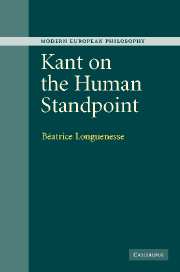Book contents
- Frontmatter
- Contents
- Acknowledgments
- Introduction
- PART I Revisiting the capacity to judge
- 1 Kant's categories, and the capacity to judge
- 2 Synthesis, logical forms, and the objects of our ordinary experience
- 3 Synthesis and givenness
- PART II The human standpoint in the Transcendental Analytic
- Part III The human standpoint in the critical system
- Bibliography
- Index of citations
- Index of subjects
2 - Synthesis, logical forms, and the objects of our ordinary experience
Published online by Cambridge University Press: 22 September 2009
- Frontmatter
- Contents
- Acknowledgments
- Introduction
- PART I Revisiting the capacity to judge
- 1 Kant's categories, and the capacity to judge
- 2 Synthesis, logical forms, and the objects of our ordinary experience
- 3 Synthesis and givenness
- PART II The human standpoint in the Transcendental Analytic
- Part III The human standpoint in the critical system
- Bibliography
- Index of citations
- Index of subjects
Summary
Michael Friedman has offered a rich and stimulating discussion of my book, KCJ. While giving a characteristically generous and clear-sighted account of my views, he maintains that on the whole I fail to do justice to what is most revolutionary about Kant's natural philosophy, and instead attribute to Kant a pre-Newtonian, Aristotelian philosophy of nature. The reason for this distortion, according to Friedman, is that I put excessive weight on Kant's claim to have derived his categories from a set of logical forms of judgment which he inherited, with some adjustments, from a traditional Aristotelian logic. In taking Kant at his word on this point, I wrongly attribute to him a traditional view of concepts and concept formation that was shared by early modern empiricists and rationalists alike, but that Kant's lasting contribution is precisely to have rejected. And I fail to give their full import to Kant's remarkable insights into the newly discovered applications of mathematical concepts and methods to the science of nature. According to Friedman's assessment, then, at worst my book ends up hurling back Kant's philosophy into the dark ages of Aristotelianism. At best, it reveals in Kant a tension between Aristotelianism and Newtonianism that more enlightened minds are now better able to identify and pry apart.
The questions Friedman raises are insightful and challenging. However, my impression is that his assessment of my position suffers from the relatively scarce attention he devotes to my views about the role of synthesis in Kant's Transcendental Analytic.
Information
- Type
- Chapter
- Information
- Kant on the Human Standpoint , pp. 39 - 63Publisher: Cambridge University PressPrint publication year: 2005
